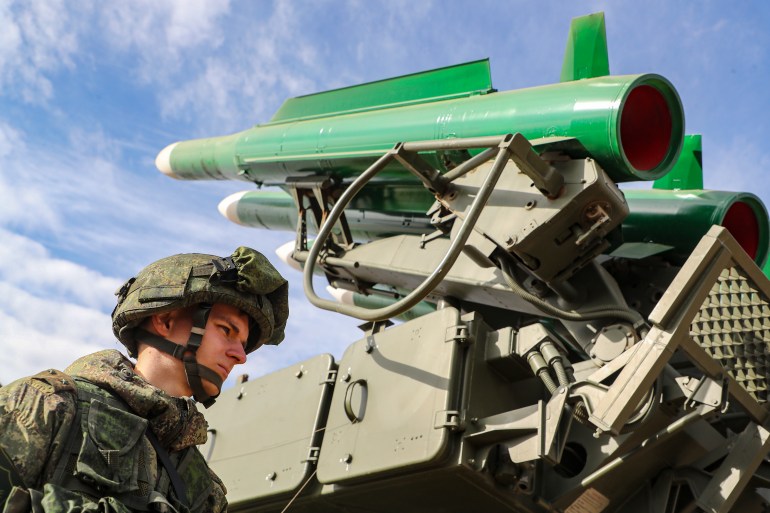The European Parliament stressed, today, Thursday, that Russia must pay a heavy economic and political price for any aggression against Ukraine, and demanded that it stop its provocations at the border.
The resolution, which was approved by the European Parliament by a majority, called on the European Union to reduce its dependence on Russian gas, and stressed the need to prepare for imposing new sanctions on Russia because of its military actions.
This comes at a time when both the European Union and the North Atlantic Treaty Organization (NATO) pledged to help Ukraine confront any Russian incursion, and warned Russia against any escalation, while Moscow announced that it had carried out a test of the supersonic "Zircon" missile amid tensions with Russia. the West.
Russia has amassed between 75,000 and 100,000 troops on its border with Ukraine, according to sources from the North Atlantic Treaty Organization (NATO).
The Russian government denies any intention to attack, but has recently spoken out about Kiev's plans to eventually join NATO.
Relations between Kiev and Moscow have been experiencing escalating tension for nearly 7 years, due to Russia's illegal annexation of the Ukrainian Crimea and its support for separatists loyal to it in the "Donbass".
European commitments
In turn, European Union leaders pledged to help Ukraine confront any Russian incursion, but they offered various solutions during talks held in Brussels, including providing military aid to Kiev, up to imposing sanctions on Moscow or holding a dialogue with it.
The European Union plans to inform Moscow that "any further military aggression against Ukraine will have enormous consequences and high costs in response," according to a draft declaration of the summit, which will be held on Thursday.
The European Union has made clear that imposing new economic sanctions similar to those imposed on Moscow after it annexed Ukraine's Crimea peninsula in 2014, possibly with the United States and Britain, as a possible response to the aggression.
Concern in Europe and America that Russia has amassed tens of thousands of its soldiers on the (European) border with Ukraine
The 27 European Union countries agreed to send a deterrent message, as Russian forces poured into the Ukrainian border region in recent weeks.
"I think we have to look at a wide range of sanctions," said Latvian Prime Minister Arturs Karenz, stressing that the suspension of the Russian-German gas pipeline "Nord Stream 2" upon the outbreak of aggression "must be on the table," adding that military support Direct to Ukraine is also an option.
NATO warns
In parallel to the European summit, NATO Secretary General Jens Stoltenberg held talks in Brussels with Ukrainian President Volodymyr Zelensky.
Speaking at a news conference after the talks, Stoltenberg said NATO countries were ready for dialogue with Russia, but warned Moscow that any further aggression against Ukraine would have a "heavy price".
Stoltenberg added that Russian military reinforcements near Ukraine are still continuing despite international pressure.
For his part, the Ukrainian president said that his country's choice to join NATO is a decision of its own and belongs to the alliance, after Russia requested binding security guarantees from the United States and Western countries not to extend NATO towards its borders and to include Kiev in the alliance.
Zelensky said he was grateful for NATO's indications on Ukraine's membership, and hoped to reach that goal without outside interference, he said.
missile and maneuvers
Amid tensions between Russia and the West over fears of a possible invasion of Ukraine, Moscow announced that it had carried out a test of the supersonic "Zircon" missile.
The Russian Defense Ministry said today, Thursday, that the frigate "Admiral Gorshkov" of the Northern Fleet successfully launched a "Zircon" missile.
It added that the missile, which was launched from the White Sea in northwestern Russia, hit a coastal target in the Arkhangelsk region, which overlooks this sea.
Russia has been conducting military exercises on the border with Ukraine for weeks despite Western warnings (Reuters)
On Wednesday, the Russian forces announced that they had conducted pre-scheduled tactical exercises using the S-400 missile defense system in the Crimea, which Russia seized from Ukraine in 2014, and said that the exercises come against the backdrop of tension in the Black Sea and Ukraine.
The Russian army in the Kursk region bordering Ukraine also conducted exercises on the "Iskander" ballistic missile systems.
On the other hand, the Ukrainian army is conducting maneuvers in the Kherson region, north of the Crimea, to test the speed of deployment of forces in the field and the level of coordination between them, according to what Kiev announced.
Door circuitous
In conjunction with the military moves and maneuvers, Russia said that it is ready to send a government negotiator "at any moment" to start talks with the United States on the security guarantees it seeks to resolve the crisis related to Ukraine.
Kremlin spokesman Dmitry Peskov confirmed that Russian Deputy Foreign Minister Sergei Ryabkov expressed Moscow's readiness to negotiate with Washington in any neutral country on Russia's security.
Peskov said the deputy secretary of state would be "ready to fly at any moment to any neutral country" to start talks, and noted that he had explained to the US president's national security adviser, Jake Sullivan, Moscow's proposals on security guarantees.
When asked about the possibility of talks between Putin and Ukrainian President Volodymyr Zelensky, Peskov reiterated Moscow's position, which says that the agenda of any such talks is not clear.
He added that there is a possibility of a new contact between Russian President Vladimir Putin and his American counterpart Joe Biden before the end of the year, denying the existence of any agreement.
The two presidents had a two-hour video call on December 7.

